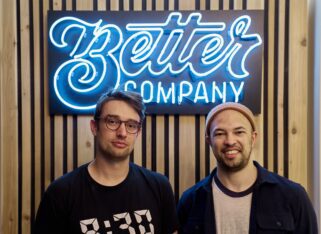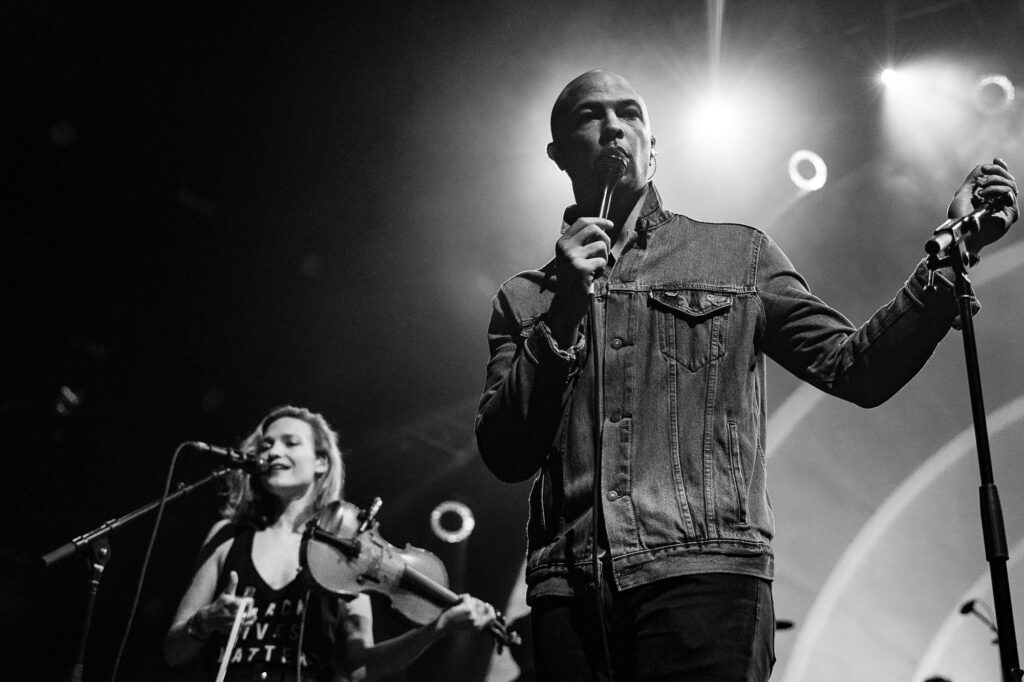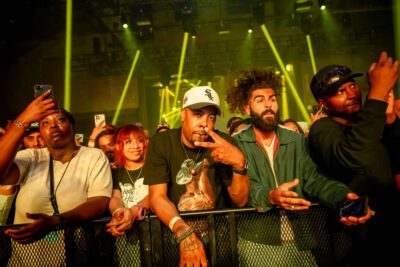The eight members of San Fermin (Photo by Alex S K Brown)
San Fermin survived indie rock burnout. Up next: Growing a record label
‘We fucking love it here’: The group, with a poppier sound on its fifth album, has doubled down on Brooklyn

Ellis Ludwig-Leone, left, and Allen Tate (Courtesy of Better Company Records)
In March 2020, like many New Yorkers of a certain age, Ellis Ludwig-Leone decamped to his parents’ house. In his case, he was 30 and that location was Berkley, Massachusetts.
But unlike many others his age, Ludwig-Leone had spent the better part of the previous decade as the bandleader of a successful indie rock group with strong classical influences. San Fermin, an eight-piece band (on stage, normally) that released its first album in 2013, has earned comparisons to the National and Arcade Fire for its lush, string-and-horn-infused pop.
Ludwig-Leone, a classical composition major at Yale, isn’t the band’s frontman, but he writes the vast majority of the group’s parts and arrangements, increasingly with the help of lead singer Allen Tate.
While in Berkley and missing Brooklyn, his post-college home, Ludwig-Leone was afraid that New York as we knew it — and the musical community he had built in his favorite borough — would disappear.
“I remember having a phone call with one of my friends where she was like, ‘Yeah, I guess this is just how it’s going to be now. We’re just going to be living out in the suburbs or wherever.’ And I just remember having real fear that that would actually happen,” says Ludwig-Leone, who is now a boyish 34 and still has the energy of a teenage athlete (he took basketball seriously in high school). “All the things that make New York so special … there’s something new and creative going on every night.”
But while others were focused on their contingency plans, Ludwig-Leone and Tate — friends since meeting at a music camp at 15 — decided to double down on the borough.
In November 2020, while driving to a show at Le Poisson Rouge in Manhattan (a show streamed online, without a live audience), Ludwig-Leone mentioned in passing to Tate that he had seen on Zillow a recording studio space on Saint Felix Street in Fort Greene. It wasn’t enormous, but it had multiple floors and had formerly been a base for Communion Music, an indie label co-founded by one of the members of Mumford and Sons. Tate said they should check it out.
“And I think there was just this moment in the car where we’re like, you know, everyone has been leaving here. And I just don’t think that that’s going to be the case forever. I think that there’s just too much here in New York,” says Ludwig-Leone. “It was just our belated way of being like, ‘No, we fucking love it here.’”
In a prophetic move, he and Tate (and a consortium of others — he wouldn’t elaborate on the exact finances) would end up buying the space for a hefty discount at the height of the Covid real estate deal era. The duo then set out on conquering another dream: starting a record label.
Better Company Records, as its name implies, is focused on building a community of artists who, in Ludwig-Leone’s words, don’t suck as people. The studio is its home base, where Tate produces and mixes records by many of the label’s artists. Ludwig-Leone sometimes helps out with string arrangements, too.
It’s punching above its weight as an operation with just a handful of employees — over the past two-plus years, over 50 artists and counting have released music through the label with the help of distributor The Orchard, a subsidiary of Sony Music. Most are variations on poppy bedroom indie rock and folk.
Ludwig-Leone and Tate are also about to release their fifth San Fermin studio album, “Arms,” on February 16. It forgoes most of the strings and horns they are known for in favor of a much more immediate pop sound.
“Every song on this album should work if you just sit down and play it [solo] on the piano. It should still be there,” Tate says.
‘The metrics change every time’
As an undergrad at Yale, Ludwig-Leone got a job assisting Nico Muhly, a well-known composer who has worked with an array of bands and classical ensembles. That led to some work for The National’s Bryce Dessner, too.
The influence of the indie rock band has waned in recent years, so it’s noteworthy that they’re still standing strong and developing as a group. In 2017, Jia Tolentino described San Fermin’s sound in the New Yorker as already feeling like a call-back to an indie era that had passed. Many of the bands she mentioned, like Bon Iver or the Dirty Projectors, haven’t released albums in several years. Many of their ilk have moved to LA or elsewhere. Another band she name checks, Grizzly Bear, has broken up; its singer left the industry a few years ago to become a therapist.
Making a living as an indie musician has also become harder than ever in the age of streaming services — members of Grizzly Bear, which played on some of the biggest stages in the world, have agreed that running a band these days a “risky small business.” Ludwig-Leone himself is plenty weary of the grind of funneling listeners to his music through social media and other online marketing devices.
“It just feels like so much of the job of being a musician is marketing yourself and doing that on social media, and that the music is almost just one small part of this larger kind of project to just tell your story as a person,” he says, sitting in the bright kitchen of Better Company HQ. “The metrics change every single time. I’m sure the next album cycle there’ll be some new thing that matters.”
But Ludwig-Leone has multiple creative (and income) outlets these days, including several projects that have allowed him to scratch the classical music itch. Last year, he composed music for a dance theater piece. He has released solo classical music and wrote an album performed by the Attaca Quartet (all released through Better Company).
Those outlets, plus the fact that he went through two breakups in a short span — one involved the end of a 10-year relationship — inspired a straightforward breakup album with San Fermin, he says.
“Going through a breakup like that, I felt this kind of good will towards other people in a way. I was just like, ‘I can’t believe that everyone goes through this, I can’t believe that the person that you see on the street also might be going through something like this.’ Whereas, you know, in our previous years, a concept record about a ghost bird — it’s a little more specific to my own imagination,” he says. “And so I think that the universality of the content made it so that it felt like, ‘okay, maybe this is a record aimed at a wider audience as well.’”
Tate has also evolved creatively in recent years, leaning into producing, engineering and even helping sign new acts to the label. Sean Seaver, guitarist in the band Divine Sweater, a formerly Boston-based band that has started releasing music through Better Company, describes Tate — who is also athletic for a musician, often sports a beanie and sings in a sultry baritone — as a comforting presence in the recording booth.
“He’s a great producer. But he’s immediately just cracking jokes. And I think everyone feels comfortable because of that,” Seaver says.
The studio space is comfortable, too; there are multiple tracking rooms, a larger room with a couch and an outdoor space. Ludwig-Leone’s cousin, a painter, uses the top floor as her own personal studio.
“The band is one creative outlet,” says Ludwig-Leone. “But not the only one that matters.”


San Fermin at Celebrate Brooklyn! in 2021. (Photo by Anthony Mulcahey)
You might also like 


























